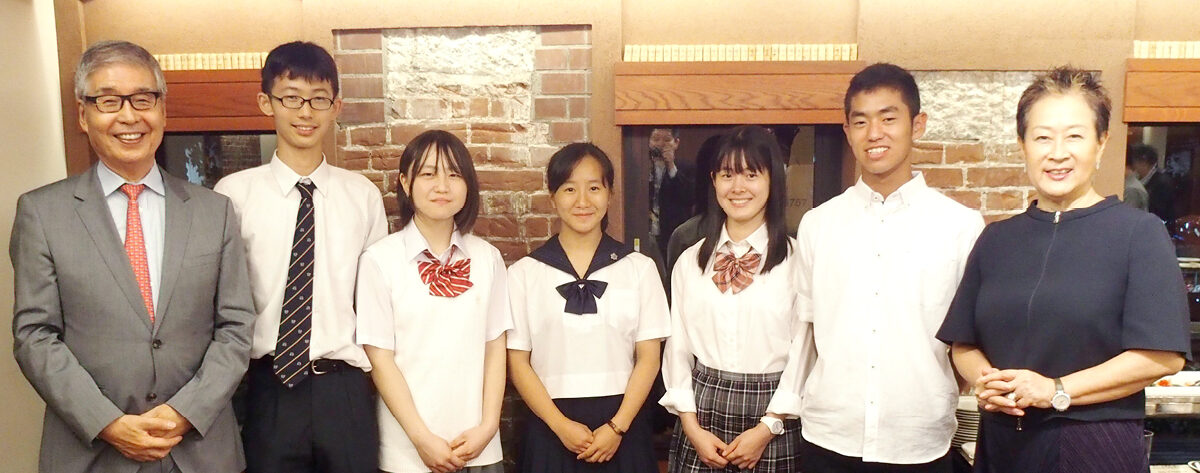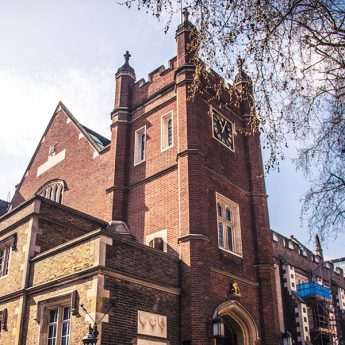The Tazaki Foundation was created in 2016 to support Japanese students wishing to pursue studies in the United Kingdom, where top schools continue to enjoy a leading position in international academia and education. We spoke with founder and President Tadayoshi Tazaki, who was also the prime mover, director and chief adviser in setting up the Japan Agency and Consultancy (JAC) Recruitment Co., Ltd.
What is the Tazaki Foundation and what does it do?
The Tazaki Foundation, as a charitable trust, aims to facilitate the development of Japanese youth by providing support for their pursuit of studying in the UK. They start with two years at a UK public school, starting at the age of 16, with a view to gaining admission to Oxford, Cambridge or another prestigious UK university, where we also support them. The hope is that these young people might eventually become truly global leaders.
Each scholarship, amounting to ¥40 million in total, is repayment-free and to be used to undertake their studies in the UK over five years.
It differs greatly from the system in Japan, where most aspiring to study overseas tend to do so immediately after graduation from junior high or high school.
In Japan, on finishing high school, a student receives a diploma recognised exclusively in Japan. But a student who passes the UK’s General Certificate of Education Advanced Level examinations—subsequent to completion of the UK’s sixth form curriculum—has a qualification recognised by universities worldwide. For this reason, I am convinced that providing young people with an opportunity to study at an overseas university sets the stage for them to become global leaders.
Why did you choose the UK?
For one, I admire the UK’s well-established approach of encouraging British nationals to develop a sense of freedom and discipline, while focusing on instilling respect for individuality and developing students’ potential and talents.
This aligns with the principles of JAC Recruitment and its philosophy that every employee should exhibit freedom of thought, high aspirations, and stringent self-discipline.
Another factor in having chosen the UK involves the notion of diversity and inclusion. I embrace the nation’s approach of treating everyone equally without showing favouritism based on constructs, such as race, nationality, or gender. This reflects the deep-rooted spirit of fair play prevalent among British people.
Further, I wish to give something back to the UK to show my appreciation for the country having enabled me to become a global leader, and the proprietor of a recruitment consultancy operating in 11 countries.
Tell us about your memories of life in the UK.
My parents initially financed my studies overseas, but I ended up running out of funds whilst at the University of Cambridge after completing public school studies. Given my lack of funds, I turned to a university bursar who felt I ought to stay at Cambridge. He recognised that I had been studying in the UK in the hope of benefitting Japan as a result of my university studies. The bursar offered me loans to cover tuition and residence until graduation. Furthermore, he told me that I wouldn’t have to start making repayments until after joining the workforce. Having been deeply moved by the bursar’s understanding of my situation, I have a deep affection for, and am grateful to, the UK and its spirit of freedom and discipline.
On another occasion, I ended up declining an invitation from my friends to join them at a pub. Although I gave the excuse that I needed to study, my refusal was actually due to concerns regarding my finances and poor English. On waking up the next morning, I found that my friends had set a beer out for me as a gesture of kindness, obviously having known my situation.
I also held numerous part-time jobs enabling me to interact with many British people. I was treated with dignity, as a fellow human being and without discrimination during that time in the 1960s, which was not that long after the end of WWII. I remain grateful to the people of the UK for that.
Did you experience, observe or hear about any culture clashes?
The adage “foul is fair” comes to mind. For instance, Japan enlists an approach deemed fair whereby students take exams derived from textbook content and graded based on objectively right or wrong answers.
In contrast, the UK’s approach relies less on textbooks, with evaluation hinging on teacher assessment. British education essentially involves instilling knowledge and competence necessary for survival as an adult, in a world ripe with irrationality and inequality. In that respect, I feel that clashes of culture experienced nowadays are not dissimilar to those I encountered some 60 years ago.
Are you doing anything special to help Japanese women study in the UK?
Young women account for some 80% of Tazaki Foundation study abroad candidates and roughly half of our scholarship recipients. We are pleased that many of today’s young women aspire to study in the UK, and we seek to actively support them.
What careers do your beneficiaries choose?
We hope Tazaki Foundation scholarship recipients go on to perform active societal roles across all fields of expertise. One of our scholars, for example, developed a talent at public school as a musician, and went on to the Royal College of Music as a scholarship student, achieving top grades. Others have pursued majors that include mathematics, computer science, economics, business management, linguistics, philosophy, politics and economics. We hope these students eventually play active roles in their respective fields of study.
What is the biggest lesson you learned there?
I find that British people embrace a deep-rooted culture of charity and mutual aid, with the nation being home to charitable organisations that take meaningful action. Having internalised that sort of culture and mindset, I went on to create the foundation in order to help Japanese youth develop into international leaders.
How are JAC and the recruitment industry doing, especially during Covid?
My wife, the co-founder, chairman and chief executive officer of the JAC Group, Hiromi Tazaki, has been spearheading business expansion efforts. Meanwhile, the recruitment market in 2021 seems to be mounting a recovery—albeit depending on the national market—after a brief phase of contraction in 2020 due to Covid-19.
Is there anything else you would like to share with BCCJ ACUMEN readers?
There are many similarities between Japan and the UK, such as both being island nations, having long-standing monarchies, and driving on the left. Given our similarities, I hope to see bilateral relations grow stronger in a post-Brexit landscape, albeit nearly a century since the 1923 official termination of the Anglo–Japanese Alliance, particularly now that Japan is poised to join the Five Eyes intelligence alliance comprising Australia, Canada, New Zealand, the US and the UK.
At a time when many companies are facing challenges due to Covid-19, I would like our firm and other BCCJ member enterprises to help promote business, as well as economic and social growth, while at the same time spurring on further Japanese development on the international stage.







